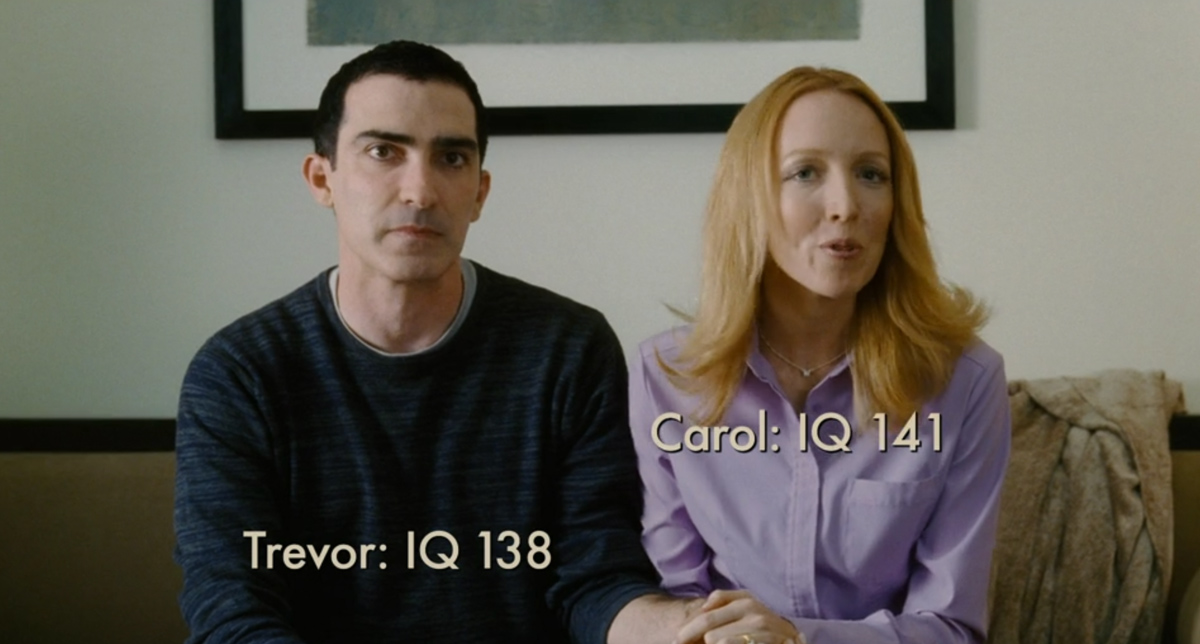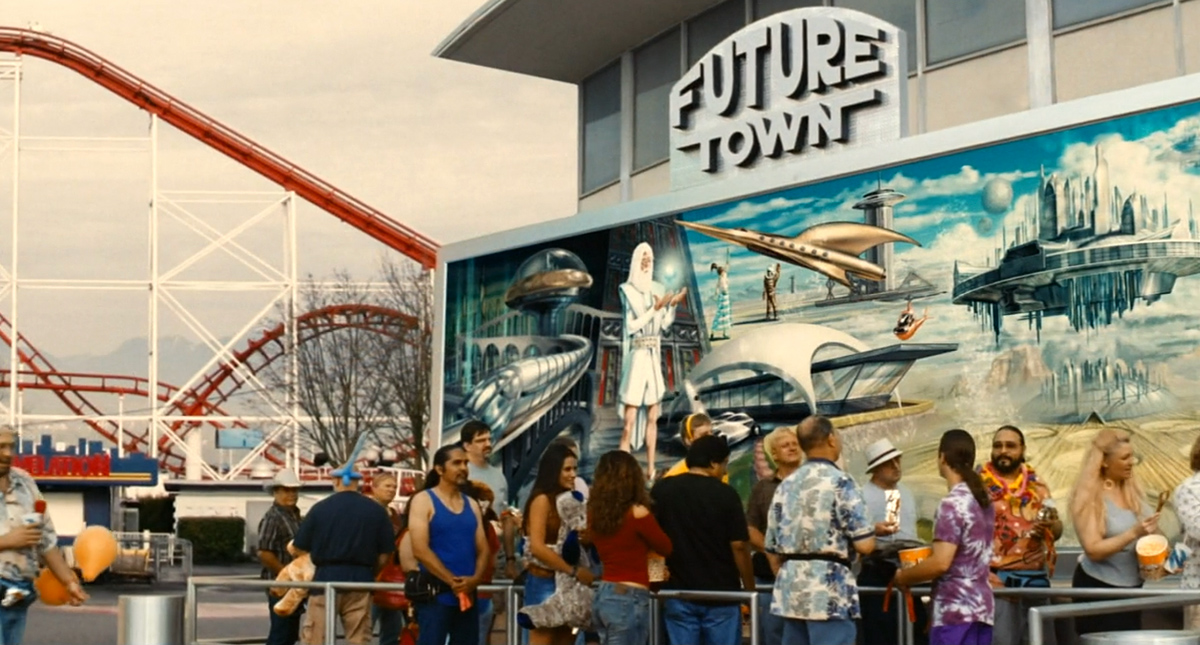
Is Idiocracy a great movie? Watching it from start to finish, then and now, it feels like a movie that never quite came together. It feels flawed, unfinished, missing something in some ineffable way, and yet: I don’t think there’s another film that I’ve thought about as often and as consistently since it came out. The same way I Think You Should Leave memes almost transcended the original sketches as cultural commentary, it’s rare to go a full day online without hearing someone reference Idiocracy. In an updated Idiocracy, Idiocracy characters would constantly quote Idiocracy.
The film, written by Beavis & Butthead creator Mike Judge and Tropic Thunder co-writer Etan Cohen, imagines a world 500 years into the future, when civilization has all but collapsed because humanity has become irretrievably stupid. It illustrates how this happened with a voice-of-God narrator and a comparative case study: the high IQ yuppie couple who sensibly wait and wait to have kids until they can’t anymore on one side, and the trailer trash meatheads (really no other way to describe them) with the giant brood of neglected children and Maury Povich-esque sex life who keeps procreating at an alarming rate on the other.

Thus Idiocracy is fairly “problematic” right out of the gate, feeling like a less overtly racist version of presentations eugenicists were probably giving in the early 20th century. Yet it has the inescapable ring of basic emotional truth to it, and in any case leads into a fairly devastating satire of contemporary capitalist society.
Even as a specific indictment of W Bush-era DUMB TOUGH GUY XTREME SPORTS culture, Idiocracy remains distinctly prescient 15 years later. Every time I need tech support from a multinational corporation and they route me to a chatbot that tells me that they’re sorry to hear that I’ve been having trouble with my internet and that they know how frustrating that can be (who doesn’t love an AI bot that can feign empathy?) I imagine the dull-eyed Costco greeters from Idiocracy, deadpanning “Welcome to Costco, I love you” at every person who walks into the store. Every time I hear a bad advertising pun, I think about the time-lapse of Fuddrucker’s slowly evolving, from Fuddrucker’s to Futtbucker’s to Buttfucker’s. Every time a politician acts like they’re cutting a pro wrestling promo, I think of the “House of Representin’.” Virtually every Trump speech reminded me of Idiocracy‘s President Camacho (Trump had even been in WWE matches!), but even before that there was disgraced former Missouri Governor Eric Greitans shooting a belt-fed machine gun in a campaign ad.

According to Mike Judge, Idiocracy even predicted Crocs.
The wardrobe had to be something that’s not around now. It had to be created for a lot of extras, and so you know our wardrobe person was looking for ways to make the budget work. And Crocs were not out in the world yet. They were just a small startup at the time. We shot in 2004, so no one was wearing Crocs. And she showed me these things, and I thought, ‘Oh those are great, just stupid plastic shoes.’ And I said to her, ‘But you actually bought these, you can order these. What if by the time the movie comes out, these things are everywhere, and it doesn’t look like we’re set in the future?’ And she said, ‘Oh no, that’s never going to happen.’ And sure enough, by the time it comes out two years later, everyone is wearing Crocs.
In Idiocracy‘s future, Carl’s Jr.’s slogan is “Fuck you, I’m eating.” When Luke Wilson’s unfrozen 21st century average guy grabs a magazine in the doctor’s office, the masthead reads “Hot Naked Chicks & World Reports.” In arguably his finest role, Justin Long, playing “Dr. Lexus,” greets Wilson, his new patient (whose comparatively erudite speech sounds “pompous and effeminate” to the future folk, according to the narrator) with “How’s it hang, ése?”
Dr. Lexus proceeds to deliver his unforgettable diagnosis: “I don’t wanna sound like a dick or nothing, but it says on your chart you’re fucked up. You talk like a f*g, and your shit’s all ret*rded.”
So yes, there are quite a few racial, sexual, and clinical slurs in Idiocracy that probably wouldn’t fly in a movie today, but mostly they feel accurate to a society being depicted as dangerously stupid. (The way Idiocracy seems to equate hip hop culture with stupidity is much more uncomfortable than the un-PC verbiage). For the record, Mike Judge has said in interviews that the language in the film was directly inspired by a childhood incident in which some of his schoolmates called him a f*g after he got all the answers right on a math quiz. Judge, remember, was a physics major, whose early, unfulfilling jobs in science and engineering inspired Office Space (he also played bass in “Shamu’s Blues Band” at SeaWorld in the eighties, but that’s another story).
Middle school bullies in 2021 might be less likely to put their antagonism in the same terms, just like corporate advertising has mostly gone in the opposite direction, now trying to imitate a pedantic gender studies professor rather than a drunk frat guy at Buffalo Wild Wings. Yet the spirit of shallow, depersonalized corporate pandering, to a fundamentally petty and credulous populace, remains the same.
Idiocracy is an anomaly in this way, a film that feels somehow both dated and relevant. It’s easy to say that 15 years later, but the truth is, Idiocracy was always an anomaly. It was filmed in 2004, bumped from its original release in August 2005, and by August 2006 was reported “shelved indefinitely.” It was ultimately released September 1st, 2006 in just seven cities, on 130 screens, with “zero marketing for the movie — no trailers, posters, television spots or even press kits for media outlets.” This per the Austin American-Statesman, which quotes a Fox executive calling this “an executive decision.”
It was long rumored that this “executive decision” had something to do with Idiocracy making fun of Fox News, and a long list of companies that did or might advertise with them. As Terry Crews, who played President Dwayne Elizondo Mountain Dew Herbert Camacho in the film, told GQ in 2018, “The rumor was is that because we used real corporations in our comedy — I mean Starbucks was giving hand jobs — and these companies gave us their name thinking they were going to get pumped up […] there were a lot of people who were backing out. But it was too late. And so Fox, which owned the movie, decided we are going to release this in as few theaters as legally possible. So it got a release in probably three theaters over one weekend and it was sucked out into the vortex.”
This is the version of the story that serves Idiocracy, that its take-no-prisoners approach simply ruffled too many feathers. And there’s probably a kernel of truth to it. But for his part, Judge offered a simpler explanation to the NY Times in 2017: that the film just tested poorly with audiences. The studio figured it might end up making them a ton of money on DVD like Office Space had. The early blogosphere was already screaming at Fox throughout this process, and yet despite it all, AintItCoolNews’s paraphrased review from an anonymous insider at the time still remains essentially true: “I’ve heard it’s crazy-insane funny, and I’ve heard it is very flawed, even hard to sit through.”
As brilliant as Idiocracy is in concept, the special effects are notably cheap — either because the studio didn’t want to pay for them or because Judge went for a Monty Python-esque look that didn’t entirely pan out — the pacing is off, and it has the unmistakable feel of a series of hilarious post-it notes sort of haphazardly strung together.
I don’t know if that’s a failure of filmmaking or simply the nature of the concept: it’s hard to delve too far, too long into a world as depressing and terrifyingly real as Idiocracy‘s. The opening shot, of a 60s-era mural depicting humanity’s glorious future, of elevated trains, flying cars, and houses in the clouds, juxtaposed with the depressing concrete amusement park where it’s painted — a giant hamster wheel for humans designed by corporation, essentially — remains as devastating as ever.

This is a film, after all, whose “happy ending” consists of the 21st-century average guy living happily ever after with a prostitute wife in a ruined 26th century surrounded by trash mountains and hooting morons. That it’s maybe a little “too real” is maybe why, then and now, Idiocracy is a movie that’s more fun to describe than it is to watch; almost as hard to sit through as it is to forget.
Perhaps the ultimate testament to Idiocracy as a cultural touchstone is the fact that even the exec describing how he botched the initial release (from the same NY Times piece in 2017) sounds like a cut scene from Idiocracy:
As we took a seat in the back of the Commissary, a restaurant on the Sony Pictures Studios lot, Mike Judge pointed out a man seated two booths away. It was Tom Rothman, the chairman of Sony Pictures and former head of Fox’s film division […]
As if on cue, Rothman approached our table, wearing glasses and a pinkish Oxford, carrying an antique lacrosse stick with a tennis ball in the basket, cradling it back and forth as he talked. He was with a friend named Lars Tiffany, who was wearing a Virginia Lacrosse shirt and, as a matter of fact, had recently been installed as the head coach of men’s lacrosse at the University of Virginia, and had taken his team to the studio to meet Rothman. “This is Mike Judge himself,” Rothman said to Tiffany. Then Judge introduced me to Rothman, explaining that I was from The Times: “Be careful what you say.”
“You’re doing a profile of Mike?” Rothman asked, beaming with excitement, which seemed to be his default mode. “You can’t possibly do a profile of Mike without talking to me! About his [expletive] movie career! Goddamn right! ‘Office Space’! ‘Office Space’ and ‘Idiocracy’!”
“O.K., so lemme just say, I’ll give you the simple answer: ‘Office Space’ is to his credit, and ‘Idiocracy’ is entirely my fault.” He turned to Judge. “Right?”
“I agree,” Judge said.
“He was [expletive] ahead of his time. As always. As always.”
“I should’ve made it 10 years later and set in the present.”
Rothman turned to me. “He had it. You’re gonna see it. How absolutely. Terri-fy-ingly. Prescient it is.” He was picking up momentum. “Right now? ‘Idiocracy’? One of the great documentaries of our era!” he said, physically punctuating his point in such a way that he managed to thump a diner sitting behind him with the lacrosse stick.
Idiocracy was never the movie we wanted. It was the movie we deserved.
